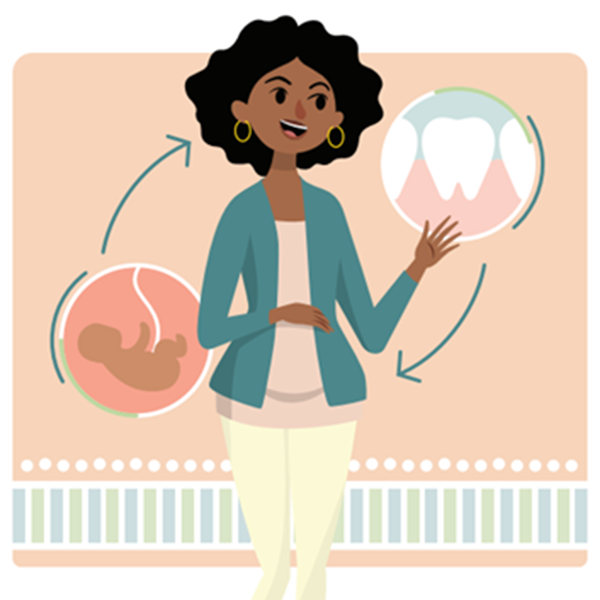Dental Care During Pregnancy
Good for Pregnant Parent and Good for Baby
by Dr. Sepideh Taghvaei, Chief Dental Officer and Co-Chair of Oral Health Access Santa Cruz
February is National Children’s Dental Health Month. Usually, promotion is focused on children’s dental health. This article will instead focus on the dental health of the pregnant parent. But why?
The pregnant parent is the most common source of transmission of cavity causing bacteria to their infants. A decision to keep the mouth of the pregnant parent healthy and treat cavities (decay) is also a decision to help protect your baby’s oral health. Going to the dentist and even getting dental x-rays is safe during any trimester.
Good oral health is important for everyone throughout the lifespan. Good oral health supports good nutrition, good speech development, a healthy heart, and even good confidence. For the pregnant parent, good oral health has even more important benefits.
Pregnancy and behaviors associated with pregnancy can lead to increased risks for cavities and other oral health challenges. Morning sickness can promote erosion of tooth enamel due to exposure to stomach acid, which can make the tooth more vulnerable to developing cavities. Cravings for sweets during pregnancy can increase consumption of cavity promoting sugary foods and drink. After a baby is born, the new parent may miss regular teeth brushing at home due to fatigue or distraction.
Some of the less obvious changes during pregnancy occur in the mouth of the pregnant parent. The hormonal changes caused by the pregnancy make the gums of the pregnant parent more prone to gingivitis (gum disease). If gingivitis progresses, it can turn into periodontitis (very advanced gum disease), which left untreated can ultimately lead to tooth loss and bone loss in the jaw. Both conditions are also associated with elevated levels of cavity causing oral bacteria (streptococcus mutans), which has been associated with pre-term labor and low birthweight outcomes. Additionally, when the pregnant parent carries a higher oral bacterial load, they are more likely to transfer cavity causing bacteria to their baby through regular parenting behaviors, such as kissing, sharing spoons, and licking pacifiers clean. Share the love, not the bacteria!
If you have pregnancy Medi-Cal, you have dental coverage for most procedures including exams, cleanings, fillings, and more. Check with your private dental insurance for covered dental services. If you do not have dental insurance, ask the dental office for discounted rates or sliding scale payment options. You do not need a referral from your obstetrician to see a dentist, but some dentists may still ask for one.
Here are the easy ways to maintain and support good oral health before, during and after pregnancy:
- Brush your teeth with fluoride toothpaste 2 times a day for 2 minutes and floss daily.
- Make a habit of visiting your dentist twice (2x) a year for dental cleanings. Visit the dentist during your pregnancy. (Let the receptionist know you are pregnant, and you may get a timelier appointment.)
- Eat a well-balanced diet. Limit cavity causing sugary foods and drinks.
- Rinse your mouth after experiencing morning sickness.
- Care, Don’t Share: have separate eating utensils for you and baby and use a clean cloth to wipe off the pacifier.
- Take your baby to the dentist for their 1st Tooth or 1st
Support February’s National Children’s Dental Health Month by taking the whole family to the dentist, especially if you or your loved one is pregnant. Everyone Deserves a Healthy Smile!
If you need help finding an affordable dentist and have Medi-Cal Insurance, visit smilecalifornia.org or call the Medi-Cal Dental program at 1-800-322-6384. For local low-cost dental clinics that accept Medi-Cal Dental and have a sliding-scale call Dientes Community Dental at 831-464-5409/ (dientes.org) or Salud Para La Gente at 831-728-0222/ (splg.org). If you have private health insurance, ask your carrier if you have dental benefits or how to get them.







